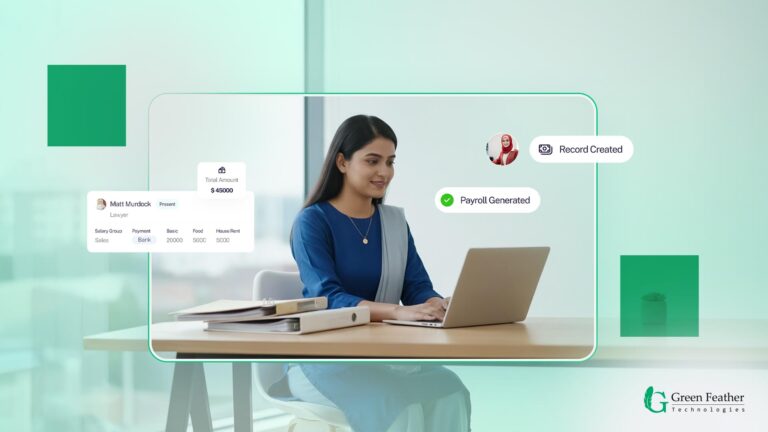Summary
This blog tells you everything you need to know about a bookkeeping virtual assistant. From their basic duties, to how they work. If you don’t know anything about what is bookkeeping virtual assistant is, then this guide will clear all confusion.
Being buried under stacks of receipts, unreconciled bank statements, and invoices is a common scenario during the tax season. What gets more frustrating is dealing with these while having to focus on core business activities for growth.
That’s where bookkeeping virtual assistants come into play. They help you manage all your financial records remotely, so you can focus on the core business. In this article, we discuss what is bookkeeping virtual assistant, and how they work. Let’s get started.
What is a Bookkeeping Virtual Assistant?
A bookkeeping virtual assistant is essentially a bookkeeper who works remotely. You can think of it like a virtual assistant with bookkeeping skills. They will manage your financial records, transactions, and report all of it remotely.
The key difference between a traditional bookkeeper and a virtual one is how they work. A bookkeeping virtual assistant uses cloud-based accounting software and other online tools to do their work.
On the other hand, an on-site bookkeeper uses the office equipment and tools to do their work.
What Are the Tasks a Virtual Bookkeeping Assistant Can Perform?
A virtual bookkeeping assistant can tackle almost any kind of bookkeeping task. They possess all the essential bookkeeping skills, combined with the uniqueness of remote operation. Below, we go through all the tasks they do –
Accounts Receivable and Payable Management
For starters, virtual bookkeepers can help you manage receivables and payables of your business. With this, they ensure a healthy cash flow for your business.
- Process Invoices Promptly: They generate and send invoices to customers instantly, thereby avoiding delayed payment cycles. These invoices include all necessary details and payment terms.
- Track Payments and Due Dates: A virtual bookkeeper also monitors all kinds of incoming payments. Additionally, they follow up on due dates to manage cash flow effectively.
- Schedule Vendor Payments: To avoid any payable issues, they also ensure that your business pays suppliers and vendors on time. It is key to maintaining good relationships with suppliers.
Expense Tracking
Keeping track of all expenses is crucial to maintaining an optimal financial condition in your business. Virtual assistants with bookkeeping skills can create the perfect systems for expense tracking. Here’s what they do –
- Classify Expenses: Categorizing the expenses to the correct accounting term is crucial for tax filing. It also provides clear insight into where your money is going.
- Track Spending: Regular monitoring of expenses based on budgets helps you identify unusual spending patterns early. An expert bookkeeping virtual assistant can flag transactions that seem out of place.
- Maintain Organized Records: They are also great at ensuring all receipts and documentation are digitally filed. It makes sure everything is accessible under one system.
Bank Reconciliations
To catch errors and prevent fraud, you have to focus on reconciling bank statements. A professional bookkeeping virtual assistant will always keep this one of their top priority. Here’s what they do –
- Match Transactions: Firstly, they will compare every deposit and withdrawal in your bank account with your accounting records. This process verifies that all transactions are recorded and nothing gets lost in the shuffle.
- Identify Discrepancies: They also try to identify any kind of issues with numbers not matching or not recording various deposits. It’s key to ensuring consistency across all financial information and correct any errors.
- Update Records: After identifying issues, they make necessary adjustments to keep your books accurate and current. Regular reconciliation means problems get caught quickly rather than compounding over months.
Financial Statement Preparation
You can never understand your company’s financial position without a proper financial statement. It requires professional experience and knowledge to prepare these statements. Here’s how bookkeeping virtual assistants make it happen –
- Prepare Balance Sheets: Balance sheets are crucial for showing what your business owns, owes, and gets to keep. The key elements, assets, liabilities, and owner’s equity, help you assess financial health and your borrowing capacity.
- Prepare Income Statements: Income statements are all about summarizing the earnings and expenses of your business. Virtual bookkeeping assistants create this statement to determine whether the business was profitable or not for a certain period.
- Prepare Cash Flow Statements: As a business, you never want to run out of cash. That’s why bookkeeping assistants create cash flow statements. It shows where cash is coming from, where it’s going, and how much cash your business has.
Budgeting and Cash Flow Management
Planning out and controlling your financial operations is very important for maintaining consistency. It’s something you may struggle with if you don’t have a bookkeeper doing it for you. Here’s what a bookkeeping virtual assistant does –
- Create Budgets: Bookkeepers can give you great input on creating budgets. They work alongside you to develop effective and realistic budgets. The goal is to create detailed budgets that provide a roadmap for spending decisions.
- Track Expenses vs Budget: A virtual assistant with bookkeeping skills can monitor expenses against your budget to stay on track. If the expenses are going off track, they can make adjustments accordingly to get it back on track.
- Monitor Cash Flow: They also predict upcoming cash needs based on scheduled payments, expected receipts, and seasonal patterns. This approach prevents cash crunches and helps you plan major purchases or investments.
Payroll Processing
Payroll calculations can get very confusing and complex at times. But paying employees correctly and on time is also very crucial. A virtual bookkeeping assistant can handle this quite easily in the following ways –
- Calculate Wages: Virtual bookkeeping experts calculate all employee wages according to their agreements. They usually consider regular hours, overtime, bonuses, commissions, and deductions for this purpose. It helps prevent disputes and tax issues.
- Process Payroll Payments: Your assistant ensures that paychecks or direct deposits are made on schedule. They maintain proper tax withholdings and benefit deductions. They also handle payments to tax authorities for withholdings.
- Handle Payroll Queries: A virtual bookkeeping assistant doesn’t only deal with financial stuff, they also handle questions. They handle inquiries related to pay, deductions, or tax forms for employees.
Data Entry and Record-Keeping
Virtual bookkeeping assistants must also maintain proper and accurate data entry to ensure reliable financial reporting. They ensure consistency and attention to detail to prevent small errors. Usually, what they do is –
- Enter Transactions: They input sales, purchases, payments, and receipts into your accounting system accordingly. Timely entry ensures your financial picture stays current, rather than being months out of date.
- Digitize Receipts/Statements: Since virtual bookkeepers work remotely, they can only deal with digital data. That’s why they convert all kinds of paper documents into digital files and organize them properly in databases.
- Maintain Audit-Ready Records: Maintaining records that are audit-ready and follow accounting standards is crucial. It makes the whole tax process much easier and smoother for your business.
Get a more detailed breakdown of data entry in your business with our Understanding the Types of Data Entry for Your Business.
Inventory and Fixed Asset Management
Maintaining the inventory is a significant activity for businesses to determine the fixed assets. Virtual bookkeeping assistants pay special attention to keep track of them. Here’s how they do it –
- Track Inventory Levels: Accurately tracking inventory ensures you never run out of stock. It also helps you find out slow-moving products. Bookkeepers monitor stock quantities, costs, and values to keep track of all these things.
- Reconcile Stock: Regular comparison of physical inventory against system records catches shrinkage, damage, or recording errors. These reconciliations are essential for accurate financial statements and tax filings.
- Manage Fixed Assets: They maintain records of equipment, vehicles, and property that your business owns. It includes purchase dates, costs, and depreciation schedules. It helps create accurate balance sheets and maximize tax deductions.
Sales Tax and Financial Reporting
Without prior knowledge or experience, it’s impossible to deal with sales tax and financial reporting. A skilled virtual assistant bookkeeper can handle all of it with proper tax compliance and reporting requirements. Here’s what they do –
- Calculate Sales Tax: They determine the correct tax rates for different jurisdictions, apply them to taxable transactions, and track the amounts collected. Proper calculation prevents underpayment penalties or customer overcharges.
- Prepare Tax Filings: A virtual assistant compiles the information needed for various tax returns. These include sales tax, payroll tax, and supporting documentation for income taxes. They ensure filings happen on time to avoid late penalties.
- Generate Reports: Beyond standard financial statements, they create custom reports that answer specific business questions. For instance, profitability by product line, expenses by department, or sales trends over time.
What Are the Benefits of Virtual Bookkeeping?
Outsourcing your bookkeeping needs to a virtual assistant comes with plenty of additional advantages. These are the key reasons why businesses are leaning more towards virtual bookkeeping rather than the traditional approach.
- Cost Savings: With virtual bookkeeping, you save a ton of money on hiring and having an in-house bookkeeper.
- Scalability: Easily increase or decrease the hours and work you need from a virtual bookkeeping assistant.
- Increased Productivity: Having a virtual bookkeeper frees up your resources for other productive and growth-driven work.
- Access to Expertise: You can get access to an expert bookkeeper immediately without having to train them.
- Accuracy and Compliance: Expert bookkeeping virtual assistants consistently deliver higher accuracy and fewer errors.
- Time Efficiency: A virtual bookkeeper can complete tasks like bank reconciliation and expense tracking much faster.
- Flexibility: Pay only for the exact hours of work you need and stop their work whenever it’s not needed.
How Does Virtual Bookkeeping Work?
The virtual bookkeeping work is a streamlined process with a step-by-step approach. It’s a combination of technology, clear procedure, and regular communication. Here’s how the whole thing works out –
- Setup: First, the virtual assistant tries to learn your business, its accounting system, and your specific requirements. You need to grant them access to your accounting software, bank feeds, and document storage systems. Tools like QuickBooks online, Xero, Google Drive, etc, are some common examples.
- Data Upload: Next thing is the data transfer protocols, which in this case are the financial information. For instance, bank transactions reach the virtual assistant directly through feeds. But for receipts, bills, and other documents, you have to upload them through a cloud storage system. As for credit card statements, invoices, and payroll reports, you have to use secure file-sharing systems. Similar tools such as QuickBooks Online, Xero, and Plaid work great for this purpose.
- Remote Access & Processing: Virtual bookkeeping assistants get remote access to your accounting software from their location. They need access to enter transactions, categorize expenses, and update records. Using software like Xero or FreshBooks, the process becomes completely seamless and secure.
- Reconciliation: Regular account reconciliation ensures accuracy. Firstly, the virtual assistant matches bank and credit card statements against accounting records. They also identify discrepancies and make necessary corrections.
- Reporting: The virtual bookkeeping assistant prepares financial statements and custom reports. They usually share these through cloud storage or email to give you the current financial information. You can then use this information in your decision-making process.
- Communication: Constant and thorough communication is critical in the virtual bookkeeping process. You must stay in touch with the bookkeeper via email, messaging apps, and video calls. They will ask you questions about unusual transactions and seek approval for significant entries.
Conclusion
Summing it up, a bookkeeping virtual assistant is the perfect person to have when you need organized financial information. With some trial and error and a continuous feedback loop, you can get great value out of a virtual assistant.
It’s all about implementing the right techniques and tools into your bookkeeping processes. Keep trying out the methods we discussed, and you should find your way into the bookkeeping virtual assistant space.
FAQ's
How do virtual bookkeepers ensure data security and privacy?
Virtual bookkeepers employ multiple layers of security to safeguard their data. They use secure and encrypted connections to access the systems. Along with that, several cloud-based accounting software also ensure increased security.
How should I structure a bookkeeping virtual assistant job description for clarity?
To structure a bookkeeping virtual assistant job description, you have to start with a brief company overview. List the specific bookkeeping tasks you need help with. Then, specify the required or preferred tools for the work. Also include practical details like the work hours per week, time zone preferences, and the scope of work. Make sure to mention the communication methods in the description as well. Finally, including the compensation range can also work out great for motivation.
What skills do I need as a bookkeeping virtual assistant?
You need to have core accounting knowledge as a bookkeeping virtual assistant. Understanding debits, credits, account reconciliation, and financial statement preparation. Having strong Excel skills is also necessary for a bookkeeping virtual assistant job. It’s also crucial to master major accounting software platforms, such as QuickBooks or Xero.
Do virtual assistants do bookkeeping?
Yes, there are numerous virtual assistants available who specialize in bookkeeping for businesses. They have the necessary set of skills for bookkeeping and focus specifically on financial tasks. Most of them also have an accounting degree and specialize in handling financial information.
What type of work does a virtual assistant not handle?
Virtual assistants typically don’t perform tasks that require a physical presence. They also avoid work that requires high-level strategic input for decision-making. Unless the virtual assistant is a licensed CPA, they don’t file tax returns or provide tax advice either.
How can businesses effectively outsource their bookkeeping tasks to virtual assistants?
The steps to hiring a bookkeeping virtual assistant are simple. First is defining your bookkeeping needs. Next, you find the right candidate for the position. Then, you have to establish some clear processes. After that, you set up the appropriate communication methods for the work. Finally, you monitor their work and give your feedback.



